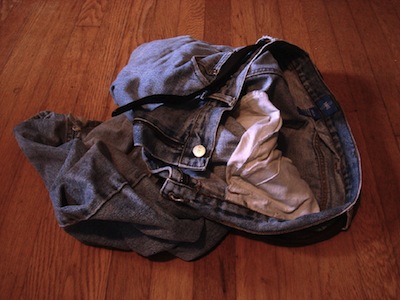Why is it OK for men to poke fun of each other’s physical flaws?
I take off my pants, belt still attached, and throw them hard to the ground like I’m spiking a football.
“Don’t you oppress me pants!” I yell at the discarded Wrangler’s jeans. I scold the leg sleeves as they lay haphazard, like deflated tentacles of a giant, blue squid. Men are supposed to have a sense of humor about body size, so I work all the angles to make light of it.
Ray-Ray, my 5-year-old and Ellie, 3, laugh uproariously at what has become a near-daily ritual. I have five kids, ages 3, 5, 12, 16, and 18, but the older three find no mirth in my pants shenanigans.
My pants bigotry is not a new thing. It stems from the simple, neutral observation that I am an ample gentleman, and pants are the fat guy’s constant oppressor. But, pants are only the first indignity in a long line of mockery, derision, and scorn with which most ample Americans can identify. I can only speak from my own experience as a beefy guy, and I am certain that men and women experience this issue in vastly different ways.
In my day job, I work at a state wildlife department. It’s a manly, bearded, and flannel-clad kind of place. Although I’m a public relations person, interacting with people and writing press releases, I work with game wardens, biologists, and other outdoorsy types. In such an environment, it is not unusual to hear someone called a “fat fuck” or a “goddamn prick.”
It’s not meant to be personal when men insult one another. If you have red hair, they might call you red or if you’re bald, they might call you baldy (in a fit of originality). For me, I sometimes hear fat ass, fat fuck, or chubby. Among men, these kinds of insults are normal, even expected. If someone isn’t cruel to you regularly, it probably means you are not well liked. Ironically, the more other men like you, the more often they might hurl a “fat bastard” your way.
I’ve worked for a very short time in a place where people don’t call each other names. It was a refreshing, but short lived experience for me. I gravitate to masculine workplaces for some reason, and I’m a product of my environment. I’m not above calling another guy a piece of shit or a dickhead. I doubt I could get a job in polite society anymore.
The deepest secret about this manly back and forth is that I think no one really likes to be mocked. I don’t, but being a manly man means never admitting it bothers you (I am breaking so many unspoken rules by writing this). If you were to take a stand against such talk or perhaps try to tell someone that it “hurts your feelings,” you would only look like a pussy and/or loser. I don’t make these sometimes difficult rules, but I live with them. There are worse indignities in the world.
One day not too long ago, I came home and peeled off my britches. Ellie, my youngest, then dropped her pants, underwear and all, and started yelling at them, while mispronouncing the word “oppressing.” Then she yelled at other things that were oppressing her, a toy and a shoe. It was a funny but sad kind of moment. No matter how she grows up in the world, body issues will remain huge factors in her life and our society. My wife and I raise our children to understand the perils of sugar and the benefits of exercise. Right now, all five are close to or well inside the “normal” weight range, but they will always have a genetic disadvantage. I would hate for them to have to put up with the same bullshit I do.
Edwin Lyngar is a writer and author living in Reno, Nevada. He graduated from Antioch University in 2010 with his MFA in creative writing and also holds an MA in Writing from the University of Nevada, Reno. His essays have appeared or are forthcoming in the Bellingham Review and Ontoligica. He blogs about parenting, family life, and writing at www.edwinlyngar.com and is in the process of finding a home for his first book, a memoir titled Guy Parts.
Related Links:

